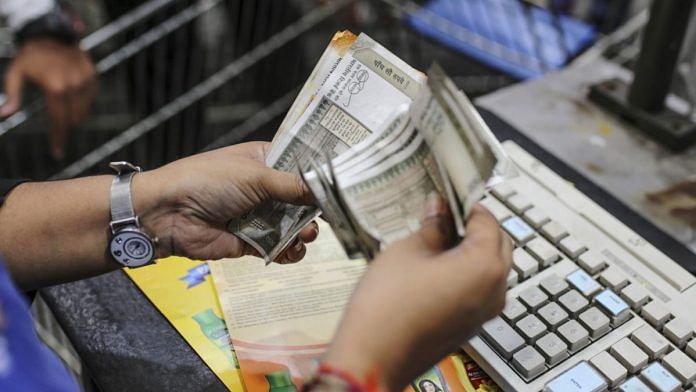New Delhi: The Income Tax Appellate Tribunal ruled Friday that there would be no tax on homemakers who deposited less than Rs. 2.5 lakh in cash during demonetisation.
The Agra bench of the Tribunal comprising Laliet Kumar (judicial member) and Dr Mitha Lal Meena (accountant member) emphasised the fact that women across the country saved and accumulated cash through various sources, which they had to deposit in bank accounts during demonetisation. This, it opined, cannot be treated as taxable income.
It observed, “Women all over the country, had been accumulating cash that they had saved for themselves from household budgets, by haggling with vegetable sellers, tailors, grocers and assorted traders, years of stashing in whatever little cash gifts they received from relatives during festival times and years of tucking away the change they found in the pants that they washed every day, however suddenly they were left with no option but to deposit the amount in the denomination of Rs 500 and Rs 1000 notes in the banks on account of Demonetisation scheme 2016, these notes were no more legal tenders.”
The Tribunal quoted Manusmriti to say that “in Indian culture women have a special place”. It noted that in 1927, Mahatma Gandhi had encouraged women to contribute to the freedom movement by donating their streedhan and other savings. It said that a “similar call was given by Former PM Pt Nehru, during 1962 war calling on the women of India to give their jewelry to the cause”.
This, it asserted, was being recorded “just to show that women in India were always saving some money for the family”.
It further noted that on 18 November 2016, the government had assured homemakers, workers and artisans that deposits of up to Rs 2.5 lakh would not be questioned.
Additionally, according to an order issued by the Central Board of Direct Taxes (CBDT) on 21 February 2017, the assessing officer has no mandate to tax cash deposits in bank accounts during the demonetisation scheme 2016, if the amount was less than Rs 2.5 lakh.
The tribunal then concluded that the amount deposited in this case during demonetisation cannot be treated as income and cannot be taxed in that manner. It said that the decision may be treated as a precedent in proceedings arising out of cash deposits made by housewives during the demonetisation scheme, up to a limit of Rs 2.5 lakh.
Also read: Modi govt scheme has reduced tax disputes by nearly 30%, but big cases still pose headache
Cash deposit was treated as income
The Agra bench of the tribunal was hearing an appeal filed by Gwalior-based Uma Agrawal, challenging an order treating the cash deposit as unexplained money under Section 69A of the Income Tax Act 1961.
Section 69A accounts for a situation in a given financial year in which the assessee is found to be the owner of any money, bullion, jewellery or valuable article maintained by him for any source of income, and the assessee has neither recorded it in the books of account nor has offered an explanation on the nature and source of its acquisition. In such a situation, the provision says that the specified valuables may be deemed to be the income of the assessee for the particular financial year.
Such unexplained money attracts high income tax at the rate of 83.25 per cent (60 per cent tax + 15 per cent surcharge + 6 per cent penalty + 2.25 per cent education cess).
Agrawal had declared a total income of around Rs. 1.3 lakh for the assessment year 2017-18. She had deposited Rs 2,11,500 in her bank account during the period of demonetisation, submitting that she had saved this amount from the money given to her by her husband, son, and relatives.
However, the assessing officer as well as Commissioner of Income Tax (Appeals) had not found this explanation to be satisfactory and had treated this amount as income, liable to be taxed.
Also read: Covid, lower rates push corporate tax collections below personal tax for first time in years
‘Cash offers them independence’
The tribunal cited a judgment passed by the Supreme Court in January which had put the spotlight on gender inequality when it came to insurance claim cases and had ordered fixing a notional income for non-earning homemakers in such matters.
It noted that several women in India don’t have bank accounts and that “women (across socioeconomic groups) are often accompanied by male relatives who deal with banking officials to open a new bank account, make deposits, etc. on behalf of their female relatives.”
“Therefore, in essence, women require the consent of male relatives to access formal financial channels, whereas cash offers them a certain amount of independence,” it added.
Also read: It isn’t the economy, genius. India proves it by voting for Modi again and again



